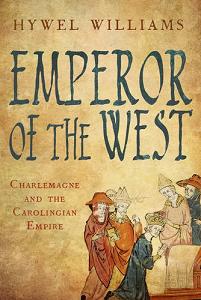
Emperor of the West
Hywel Williams
460 pages including notes and index
published in 2010
Emperor of the West: Charlemagne and the Carolingian Empire is a book I ran across when looking for other books in the Middelburg library, but which turned out to be exactly the book I needed to read after having spent most of December reading Peter Heather's empires and Barbarians. Heather's book was a comparative history of the first millennium CE, from the Late Roman Empire through to the Carolingian and Ottonian empires, of which the Carolingian was the first European empire with had its power base in north-west Europe, as opposed to the Mediterranean basin. Heather's focus was on the interactions of these three empires with the various "barbarian invasions" each had to deal with and how these shaped what would become modern Europe, but what it made me want to read was more about the Carolingians themselves, which is where Emperor of the West came in handy.
Though not quite an introductionary level book -- some familiarity with the various characters is expected -- Emperor of the West turned out to be a good overview of Carolingian history. Williams' main focus is on Charlemagne himself, but through him looks at wider Carolingian culture and history. He consistently puts Charlemagne in the context of the Western European recovery from the fall of the Roman Empire in which the awareness of imperial Rome and its history helped shape Charlemagne's empire, in the same way that the Carolingian conviction that they were uniquely blessed by Christ also did. The Carolingians always looked back to the Roman past and consciously set out to restore it in their own image, but in the process created something new, the first European empire not to depend for its power on the Mediterranean Basin.
It's therefore not surprising that Emperor of the West starts with a short history of the Franks and the end of the Western roman Empire, followed by the story of the Merovingian dynasty that would ultimately be overthrown by Charlemagne's ancestors. This provides the background to the story of Charlemagne himself, his rise from prince to sole ruler of the Franks, and how he made an empire out of what had been a disparate collection of countries. In the process he laid the foundation for what would become modern western Europe.
The heart of the book is formed by the story of how Charlemagne conquered his empire, from its base of the old Frankish kingdoms Neustria and Austrasia, ultimately including the duchies of Aquitaine and Provence in France, Alamannia and Bavaria in Germany, the Lombard kingdom in Northern Italy, plus the Frisian and Saxon territories in Holland and Germany, as well as large territories in Central Europe, the Elbe and Danube forming the Eastern most borders of Charlemagne's empire. It's in these wars against the pagan Avars, Slavs and especially the Saxon tribes in these areas that we find the first sort of Christian crusades, wars started not just for political and economic considerations, but also to convert pagan peoples to Christianity.
The Carolingians and Charlemagne especially always thought of themselves as the most Christian of rulers, the most pre-eminent Christian power in Europe, maintaining good relationships with succesive popes in Rome. This of course culminated in Charlemagne's coronation as emperor by pope Leo III, the first non-Roman emperor in Europe. Williams shows how careful both pope and emperor were with this coronation, how Charlemagne especially was careful not to offend the Byzantine heirs to Rome with it.
Williams provides more than just a chronological history, through chapters dealing with how Charlemagne rule his empire in practise, as well as the economic basis of Carolingian civilisation and the cultural revival that took place during it. In all these chapters, as well as the more chronological orientated ones, Williams cuts back and forth between Charlemagne and his predecessors and successors, as well as establishing crosslinks between e.g. Charlemagne's governmental needs and the development of Latin into a more precise, clear language suitable for government communications in an empire that spawned several countries and peoples.
In short, taking a gamble on this book when I found it in the Middelburg library was the right thing to do. Nice and clearly written, Emperor of the West is a good introduction to a very interesting era of West European history.
Webpage created 30-12-2010, last updated 01-01-2011.